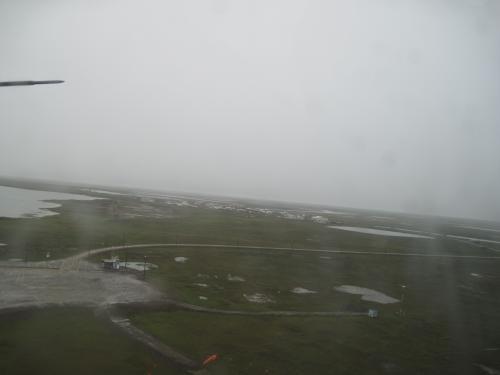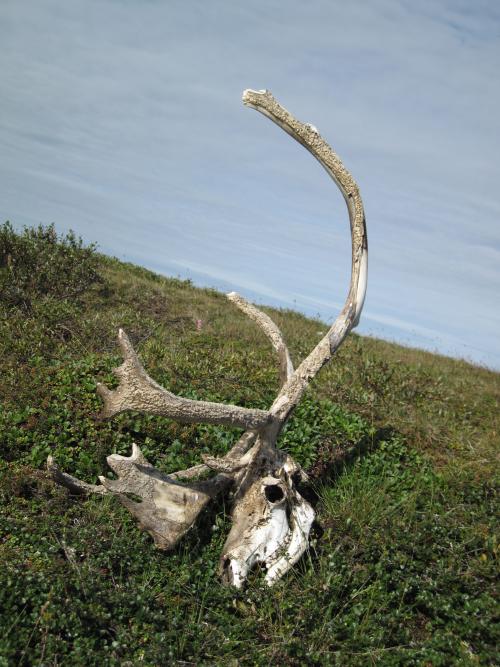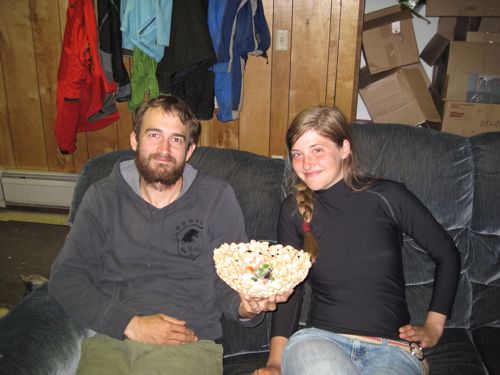When we left Atqasuk today for Barrow, it was raining and foggy. Only a few seconds after takeoff from the dirt airstrip, the village disappeared into the clouds below. As usual, I got to thinking on the flight...

I was sad to leave Atqasuk. It had really become like home to me: trekking through the tundra, hanging out at the school, and playing the nightly thumb clicker-counter contests.
When I saw the school for the first time, I felt like I had walked into an educational utopia: small classes, loads of new equipment, latest technology, a personal MacBook for every student in grades 5 through 12, and yes, every student had a huge locker. I also met some incredibly dedicated teachers who face the same challenges that we face in the Bronx. They are trying to raise their graduation rates and improve their test scores just like we are.
I played tag and talked with the kids in town. They are just like my students. They are curious about life outside the village and want to know what the big city (New York) is like. They like their cell phones, iPods, and tech. They like to joke and play around the way all kids do. They also like to go on hunting field trips with their friends and teachers.
People may have different cultures. They may eat different foods and speak different languages. However, we are all kind of the same. We are just adapted to our own local environments: urban metropolitan, tropical rainforest, suburban Midwest, Arctic tundra.
Life was slower in Atqasuk. There were no malls, only a small store inside a villager's house that was open four hours a day, six days a week. There were no paved roads, but there were a lot of ATVs. There were no parks but there was the school playground and the vast tundra surrounding the villege...the most natural park possible.

I hiked passed this skull of a caribou. This is all the I found remaining of this particular animal. It seems pretty new because hair is still visible in some places. It's interesting how quickly the soft tissue is gone and all that is left is the bone and some hair.

Entertainment was created instead of purchased. Friendships formed fast. And everyone knew who we, the researchers, were. Once someone found out you needed something, then help was given by many. When I wanted a CD-rom to give the school a copy of the pictures I took, no one at the school had any but within an hour I had a stack of blank CD-roms by my backback.
The tundra was an experience unto itself, entirely different than that of Barrow. I never imagined that the land could vary so greatly in only sixty miles. All the Atqasuk plants were HUGE in comparison to those in Barrow. It felt so different to walk on the tundra with all the tussocks and deep creeks created by ice wedges. The mosquitoes were huge too. Even though they pestered me to no end, there is both a beauty to them and necessity for them, and now I can appreciate that.
When the plane landed in Barrow, I was back in a town of 4,000 people, quite a change from the 217 of Atqasuk. I now know why people ask each other upon returning to Barrow: "So how's it feel to be back in the big city?" Barrow feels so big. It's overwhelming, like when I travelled to New York from Columbus for the first time! There's so many people and everything is so spread out. There's a store, a library, a hospital, and an airport. What's funny about this is that there are about the same number of people in Barrow as there are in my entire school building! It's amazing just how quickly our perception of "normal" changes...I guess we are just adapted to our environments.


Comments